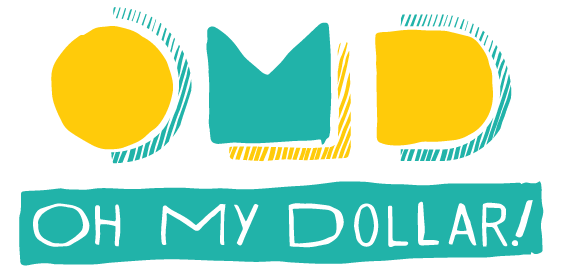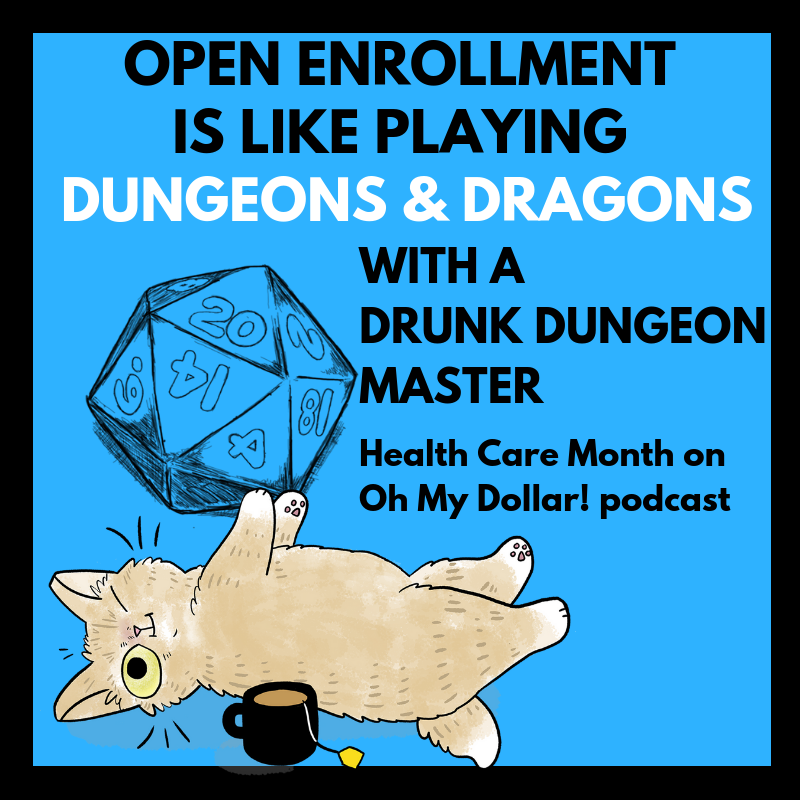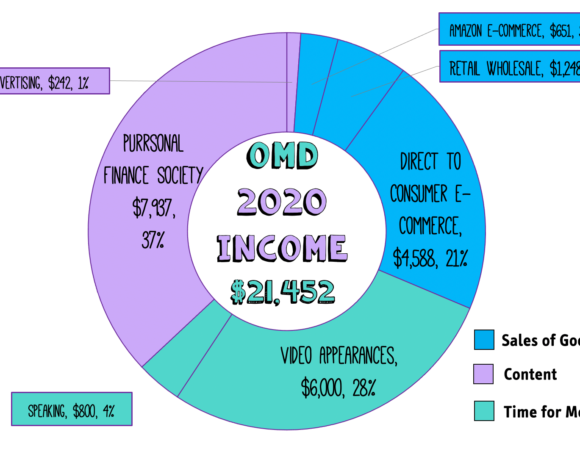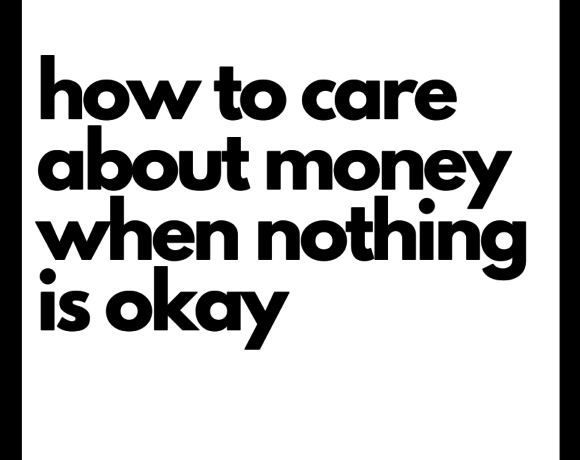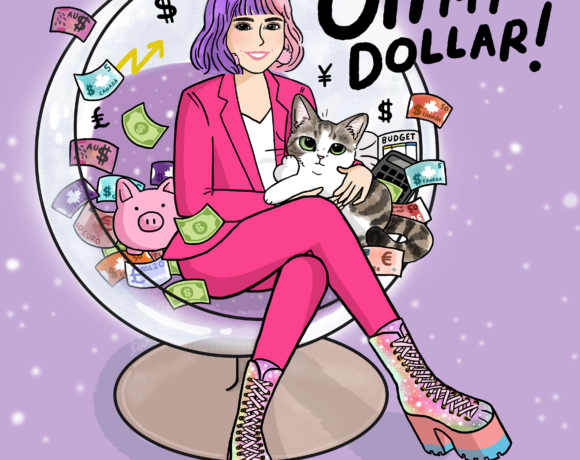: This show is supported by generous listeners like you through our Patreon, this episode was underwritten by the Tamsen G Assocation and Warrior Queen. To learn more about ways to support Oh My Dollar! and get cool perks like exclusive live streams and cat stickers, you can visit ohmydollar.com/support
: Welcome to Oh My Dollar! A personal finance show with a dash of glitter. Dealing with money can be scary and stressful. Here we give practical, friendly advice about money that helps you tackle the financial overwhelm. I’m your producer Will. Here’s your host Lillian Karabaic.
: Thank you Will! It’s Health Care Month!
: Health Care Month.
: I love Health Care Month. We are devoting multiple episodes this month which is defined as the middle of October to middle of November, because that’s when Health Care Month is, o untangling the mess of money confusion in health care and that is because November 1st is when healthcare.gov exchanges open so you do get your health care through the exchange, that is open enrollment for you! Which is the time to switch plans or get a new plan or add dependents or if you work a job and get employer-sponsored insurance, it’s likely your open enrollment season is about now. Once again, if you’re not an American listener, I apologize. Please go rub your socialist health care all over yourself.
: You go buy affordable drugs at a pharmacy.
: That’s like the sickest burn.
: Gotcha.
: Go buy your reasonably-priced medical care.
: We have two listener questions today. First up one is from Anna. Well you read it, Will? yeah.
: Anna says hello. I sent a question awhile back about whether HSA were evil Republican scams or useful tax shelters. I’ve since made maxing out my HSA part of my money goals. I’ve been successful so far this year, which created a potential problem. I was super on the ball and maxed out my HSA contributions a month or so ago – yay! Then, I got a new job. Also yay! Now I’ve picked insurance at my new job, which again an HDHP with an HSA, which includes an employer contribution to my HSA. I should get this money this year which means that when it hits off over-contributed the allowed amount. Boo! Is there something I can do to fix this?
: Oh Anna! One, I’m so glad to hear that that last episode which we did during health care month last year.
: I Remember that.
: Helped you choose to max out your HSA and that you succeeded at your goal! That’s super rad and congrats on the new job. Sounds like you kind of are in a situation of having too much of a good thing with your HSA. So this is good information to know for anyone. There are reasons why you could end up over contributing to your HSA. Changing jobs is one of them. Sometimes you can just do the calculations for how much you’re allowed to put in them wrong if you’re self-employed. Since you discovered this before taxes are due, it’s actually super easy for you. It gets a lot more complicated, if you discover it after taxes are due. All you can do is just take out the HSA contributions that put you over. So, for example if you’re like $1200 over because you’ve got a $1200 employer contribution you could just take out those HSA contributions and declare them as extra income on your taxes.
: There is an easy way to withdrawal some or all the excess contributions and not pay the excise tax on the amount withdrawn but you do have to meet the following conditions. You have to take them out by the due date, including extensions of your tax return for the year that the contributions were made so it’s actually like by October which would be the extension date – October of next year, to be clear.
: You also withdraw any income earned on the withdrawn contributions and include this earnings and other income for your tax return for the year – that you withdraw the contributions and earnings. So this is important!
: It sounds like you, you mentioned you might invest your HSA last time, so if you have some small percentage of money that your HSA earned which frankly, because it’s only been a couple of months, it’s probably only going to be a couple dollars unless you don’t know have the best investment.
: 10 percent interest.
: But you need to make sure to pull that out as well undeclared as other income on your tax return for the mechanics of actually doing this – which I realize it’s like, but how do I pull it out? Do I use the debit card and just take it out as cash?
: Right.
: There’s usually an excess contributions form that you can fill out and your whoever administers your HSA will have an excess contributions form, like this is a pretty normal problem. I mean the bad news is that you’re not special but the good news is you’re not special.
: *laughs*
: And since it sounds like this is only going to be a small amount of money it’s going to be relatively easy.
: So basically it’s just going to be treated like you didn’t put that in there.
: You’re just going to pay regular taxes taxes on that money. So in general it’s great. There is one other option which is to use your HSA over-contribution in a future year. But you have to actually pay a penalty for that so there’s rarely a reason to do that. Especially if you notice before tax time. The main reason that you would do that is if you noticed after tax time that you overcontributed in the year prior then you could pull that money out and then just count it as a future year.
: So that would be like if you already goofed and didn’t realize it before like –
: the penalties are kind of annoyingly steep, considering that you’re still going to be using this on health expenses.
: Like how steep?
: I think it’s seven point five percent.
: Okay so that’s a good chunk of your money there.
: Is a chunk. So, you know, my biggest recommendation is actually just pull out the money and pay regular taxes on it. So we have another listener question from Allison.
: Allison asks I’m confused about the fact that the federal open enrollment period doesn’t overlap with some companies open enrollment and those also don’t necessarily overlap with each other. If you want to switch insurance to your spouse’s employer or from an exchange plan to one with a new employer, there’s a large overlap in the time period are you just supposed to pay for both insurances at the same time? Getting a new job doesn’t seem to be a qualified life event. If you didn’t leave a previous jobs health insurance or move away at the same time.
: Yes.
: Ok. This is a great question. So the first thing to know is that there is great news you have the right to enter your exchange health coverage at any time. You just have to send a notice like you would do with like a month to month apartment lease or like your cable contract or something like that.
: Your Comcast bill.
: In many ways it’s actually easier to cancel than a Comcast bill. You may need to end your marketplace plan if you get other health coverage. So if you if you’re on an exchange plan, and then you get a new employer that provides health insurance, you would just cancel your coverage. So you would need to wait until you have access to a new plan. So if you’re on a marketplace plan you would just wait until the open enrollment period either at you or your partner’s work during open enrollment or maybe when you start a new job and become eligible like commonly you become eligible after 30, 60, or 90 days on a new job for their health insurance and then you would just wait until that period till you become eligible which is either open enrollment or because you’ve started a new job and have hit that entry period. And then you would just end coverage for everyone on the exchange plan and your termination would take effect as soon as the day you cancel.
: Okay.
: You can also set the marketplace coverage to end to a date in the future. Like if you know new coverage will start on the first day of the following month or something like that.
: So you can have it you can have your former plan canceled. Right. Right when the new one kicks in.
: Yep totally. I’ve done this before it’s a thing you can do it. I’ve done it. It’s not even that agonizing. So, yes, you can’t suddenly enroll in your spouse’s insurance at work mid-year if you don’t have what’s called a special enrollment period. So, you’d have to wait it out and cancel your plan until open enrollment if you’re on an exchange plan. Open enrollment at your spouse’s job.
: So it sounds like a little risky. Yeah.
: So you essentially just have to wait out for open enrollment at your spouse’s job. That’s actually the easiest scenario right here where you’re on an exchange plan which you can cancel and you’re just waiting until open enrollment and your spouse or you won’t have to double pay in that case.
: However, canceling your group insurance through work is a bit trickier. There are two specific circumstances that allow you to drop your group health insurance outside of open enrollment.
: In most cases to qualify you must be enrolled in what’s called a Section 125 cafeteria plan which sounds like it has to do with food but it has nothing to do food
: I think that was my college dining plan.
: Section 125.
: This is considered- This is the good news is that like even though it sounds really technical that’s actually most health care plans that are essentially just generally means that you’re paying pretax but you also need to have your hours reduced to fewer than 30 hours a week but still retain eligibility for your group’s health policy, or you need to opt to buy coverage through the Affordable Care Act marketplace plan. So what you could do in a tricky situation, if you’re trying to get off of your work plan and you still qualify for it and your work has not dropped below 30 hours a week. Is that you – if if you don’t have the option to drop it, you could drop it and say that you’re getting on an exchange plan, but you can only join an exchange plan during open enrollment.
: Oh OK.
: Does that make sense? Sort of. So I the big thing to know though is that losing your health insurance legitimately is a loss of coverage. So if you leave a job where you were covered under health insurance, you will likely qualify for a “special enrollment period” on your spouse’s health insurance.
: Oh okay! Because you lost your coverage and that triggers the special enrollment period.
: And that trigger special – loss of insurance is a special enrollment period.
: So let’s say you leave a job with health insurance and may end your partner’s health insurance Open enrollment is in September, you would count as losing your health insurance so you would be able to enroll outside of that September open enrollment. But if you just like your partner’s health insurance better, like you don’t have super great health insurance through work but you want to wait until your partner’s health insurance, but you don’t qualify to leave your group health insurance plan – then yes you have stumbled on to the very annoying thing where you may end up having to double pay for a couple of months if your open enrollment at work does not line up with your spouse’s open enrollment at work because you won’t be able to cancel that plan and get onto an exchange plan until the open enrollment period, unless you somehow finagle your way out of being
: Eligible.
: Eligible. Yes right. That would count as a loss of insurance.
: You saw some doctors or something.
: Yeah and this is I mean this is a like really really. We’ve used a lot of terms in this – special enrollment period and open enrollment and it can get really confusing.
: So it sounds like people talking about playing Magic cards kind of.
: It’s kind of like you’re you’re calculating your like and trends when you’re rolling multiple dice in DND – but like none of them like actually coordinate. It’s like you’re playing DND, but like one person who’s playing with a six sided die and one has a 12 sided die.
: And the rules are poorly written and perhaps even malicious.
: Yes exactly.
: So you heard it here playing DND with a drunk DM is kind of like what health insurance in the U.S. is like. So I mean the good, the good news here for you is that open enrollment periods are often the same time of year. They’re usually around right now which is why it is health insurance that.
: It’s health insurance month -Health Care Month.
: That’s why it’s Health Care Month on Oh My Dollar! But the good news is that you essentially if you do have something that triggers what is called a special enrollment period I’ll put down the common “special enrollment period” Things generally this is get married, have a kid, lose insurance = actually moving states is not actually usually are mutually moving states would you know you’d be changing jobs. And so then I would be lost of insurance but if you like it moved states and for some reason your job doesn’t let you switch and you may have to stay enrolled in a plan that doesn’t really help you and your in your new state.
: What are your plans on a state marketplace plan and moved?
: I believe if you move out of state and you’re on an exchange plan you will the exchange plans you can cancel any time.
: Oh OK.
: So yeah those those you can cancel any time. So we’re going uses if you’re on an exchange plan, and you have that ability to cancel it at any time which is really nice because they’re meant to kind of help people that don’t have access to insurance otherwise. And you know, for some people the goal is going to be getting into a job that has benefits and has health insurance for them. And it’s nice to know it’s there and you’re not going to be stuck double paying. Another option would be of course if you just really like your spouse’s insurance at work and you hate yours at work – is to get married or lol have a kid because those would trigger a special enrollment period.
: Oh!
: So I’m just say that’s an option –
: probably better reasons – and probably worse reasons to have kids.
: I think the amount that you would pay for insurance for a couple months is probably less than the amount you would pay to have a kid.
: Yea probably.
: This is basic economist calculations right there.
: Ok. Run the numbers before you have a kid just to get off of your insurance plan.
: As always is about running the numbers – and your values. Do you want a kid? Anway, I hope that answered both of your questions. Thank you so much to our listeners that write in this is going to be our second to last episode during health care month, but if you send in another question we will hopefully get to it.
: It’s the penultimate –
: penultimate episode. And you know, as always, we will answer your questions year-round about health care but we like to cram them all in this month. And if you are waiting to get insurance through the exchanges, please know that your plans may have changed in the past year, they may have been discontinued. So, it is possible that you do have to log in and actually re-enroll if you are on an exchange plan. So check it out. Make sure just don’t set it on default, don’t procrastinate because you’ve only got six weeks to enroll on the exchanges.
: So you’re talking directly to me.
: Will – I am looking at you.
: Yeah and Will, do you have a reminder for folks about our campaign that we’re doing?
: I do! A quick reminder that we’re on a mission to get 50 reviews and 100 ratings on iTunes before the end of the year. Right now we’re at 18 reviews and 52 ratings – takes about ten seconds to click the stars to rate us. So please help!
: I think that wraps our show for the day when our producer is Will Romey and our intro music is by Aaron Parecki. I’m your personal finance educator and host.
: Thank you for listening. Till next time. Remember to manage your money, so it doesn’t manage you.
Automatically convert audio to text with Sonix

